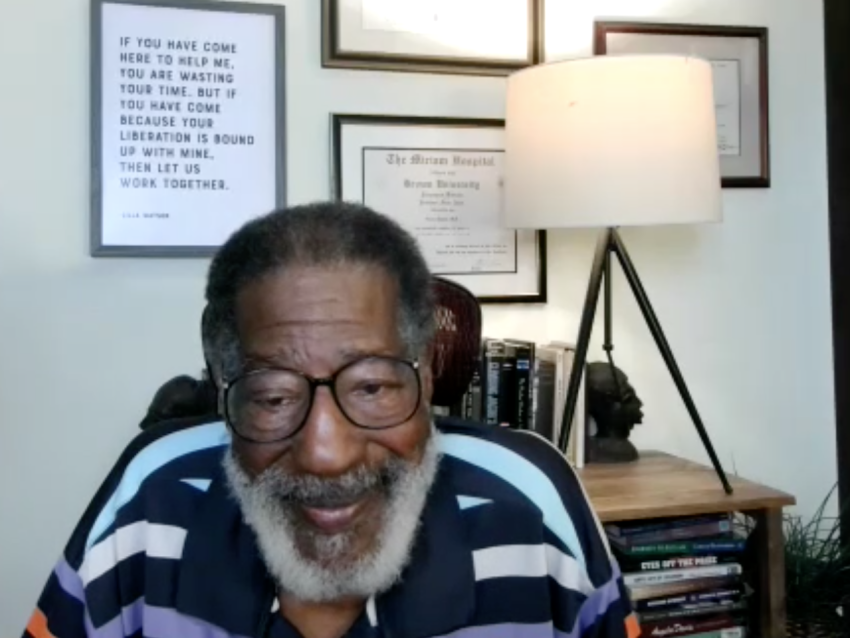
Vertner Taylor ('60) says family taught him 'some of my most valuable lessons'
The year 1960 was a year of significant change. While Ruby Bridges was the first African American child to attend an all-white school, Vertner Taylor graduated from the University of Kentucky College of Pharmacy (UKCOP), making him the college’s first African American graduate. Taylor’s completion of his Bachelor of Science degree predates Dr. Martin Luther King Jr.’s “I Have a Dream” speech, as well as the Civil Rights Act of 1964, making his achievements that much more significant.
A Lexington native, Taylor graduated from the old Dunbar High School and received his undergraduate degree from Xavier University in New Orleans, Louisiana. Following graduation, Taylor followed in his father’s footsteps and began his pharmacy education at UKCOP. Taylor enjoyed his time at the college, where he was one of the first Black members of a pharmacy fraternity, helping him integrate socially with his peers and cultivate a support system for his college career.
“The other students were very affable toward me; I had a good time at the University of Kentucky,” Taylor said. “Most of the other pharmacy students treated me well. Of course, there were some prejudices, but nothing out of the norm for the time.”
Despite Taylor’s positive experiences at UKCOP, he was not immune to experiencing racism. Segregation and other racist ideals of the 1960s had a major influence on Taylor's education and career direction.
“African Americans were not always able to get the same education as other students,” Taylor said. “For instance, some high schools provided students experience with chemical equipment that would help to prepare them for college—Black high schools didn’t have that—they had to learn on the fly. Even when I graduated pharmacy school, I was sent to Chicago because Kentucky was not hiring Black pharmacists at the time.”
And while much has changed since Taylor graduated, too many things have remained the same. Black and African American students today are often faced with imposter syndrome—the idea that one is unqualified or undeserving of their accomplishments. In particular, students of color have to deal with the feeling that their achievements are based on a push for diversity as opposed to actual ability.
To those students wondering about their place in a professional or graduate program, Taylor offers words of wisdom. “There is a certain standard schools ask for, and if you are excelling in interviews and passing exams, you have earned your place, and there should be no second thought about whether or not you are qualified,” Taylor said.
Completing one of the top pharmacy education programs in the nation provides graduates with a solid foundation to begin their careers. However, there are some skills not taught in a classroom. For Taylor, his family inspired him to stay focused, motivated and to push through to complete his degree.
“My family taught me some of my most valuable lessons,” Taylor said. “UK has been one of the top pharmacy schools since I graduated and has given me a great academic foundation. But as far as living and treating others the way you want to be treated, my family instilled that in me.”
The values and skills passed down to him by his family would prove useful in his career as he navigated relationships with patients.
“Understanding people and gaining their trust is very important; that’s not a skill you learn in a classroom. You learn that just by living your life,” Taylor added. “Some patients can mask how they are really feeling, but by acquiring empathy and other social skills, you can see through that.”
Taylor applied the skills learned both inside and outside of the classroom throughout his lengthy career in healthcare. In 1961, just one year after graduating, he became the first African American pharmaceutical sales representative for E. R. Squibb and Sons in Chicago. He later became the associate director of pharmacy for the University of Chicago. Following, he helped create the nonprofit organization Hunter Foundation (now named Healthcare of the Bluegrass), named after Drs. John and Bush Hunter, an African American father-son duo who served to the Commonwealth for a combined 113 years.
Taylor’s career would come full circle in 1999 as he was the inaugural recipient of the Lyman T. Johnson Torch of Excellence Award.
Dozens of Black and African American students have graduated from UKCOP since Taylor’s graduation 61 years ago. However, he said he’d like to see those numbers increase even further.
“We do not have enough African American pharmacists,” Taylor said. “People become professionals when they see people that look like them succeeding in that field; I see very few Black pharmacists serving as a role model for future Black pharmacists. It was true during my time and is still true today.”
Despite his accolades, Taylor’s proudest piece of his legacy is his family and being able to see them succeed.
“I am very fortunate to have the children that I do,” Taylor said. “My children and grandchildren have made me immensely proud.”
The personal and professional legacy of Vertner Taylor serves as a leading light for today’s pharmacists. Not only did he blaze a trail for himself, but he left a path behind for the generations of African American pharmacists that followed.
